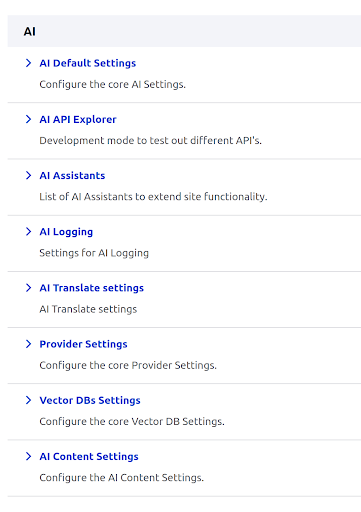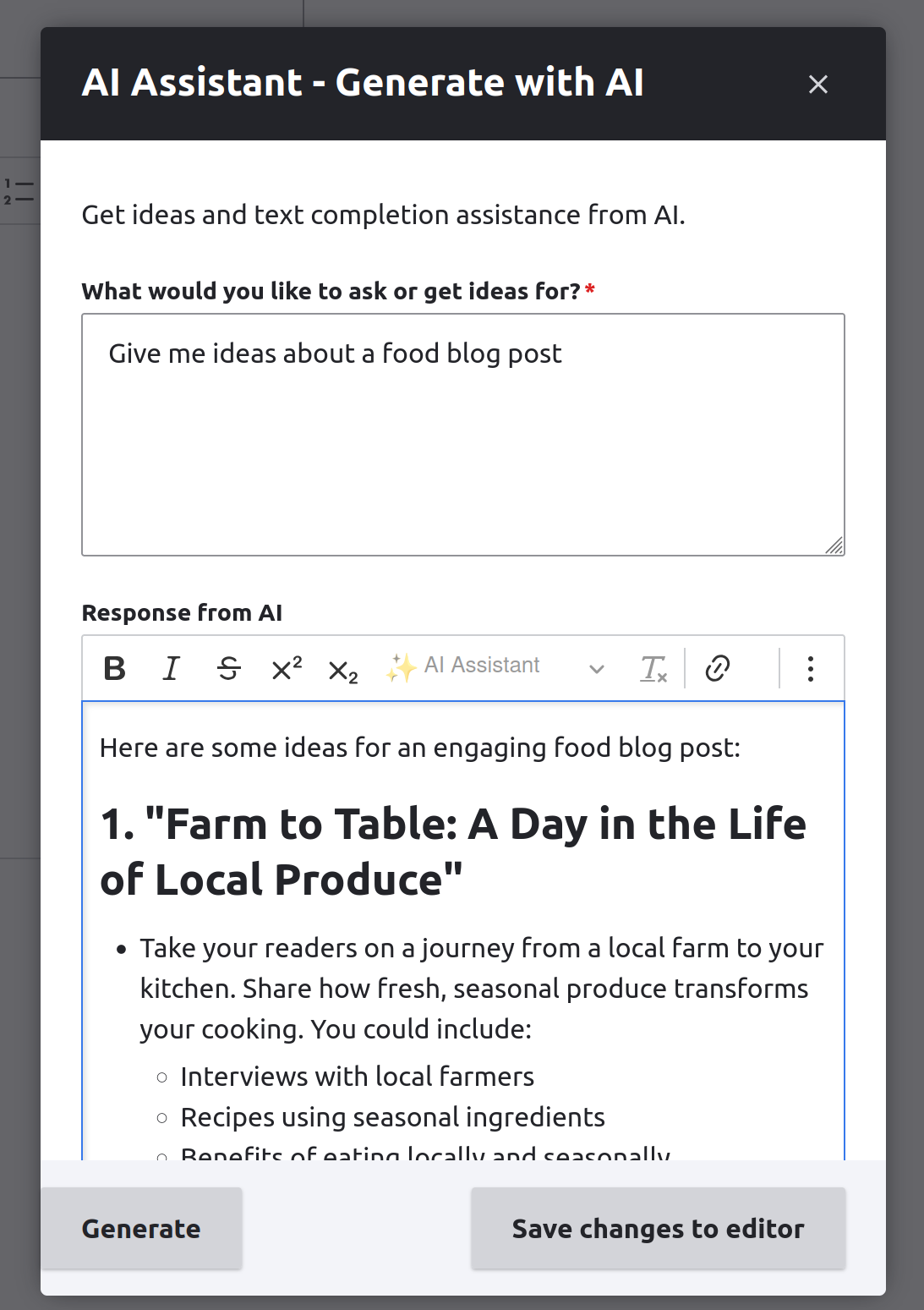With AI fever spreading across the globe, many of the ways we are working and the tools we use are changing; Drupal is no exception. As always, the Drupal community worked together to create a new module that enables all the power of AI into the Drupal admin experience –the AI Module.
Drupal + AI: Your Personal AI Assistant Within Your Drupal Website
What is the Drupal AI Module? A Quick Overview:
Think of it as a powerful tool that uses artificial intelligence to perform a host of tasks directly within your Drupal site admin. It can help you to:
- Generate new content: Need a blog post but up against a deadline? The module can generate ideas and even draft entire articles for you.
- Translate content: Want to reach a global audience? The module can translate your content into multiple languages quickly.
- Summarize long content: Have a lengthy article that needs condensing? The module can create concise summaries.
- Optimize content for search engines: Are your traffic numbers lower than you’d like?? The module can help improve your search engine rankings.
How Does It Work?
It's like having a magic wand for your content. You give it a prompt or request, and it uses AI to generate the desired output. In the same way that you write prompts on an AI interface, you can do it in the Drupal admin panel.

There's a huge variety of customization available within the Drupal AI module.
Is It Difficult To Use?
Not at all! Once the module is installed and configured, you can start using it right from your Drupal admin panel.
Costs:
While Drupal and the Drupal AI module are free, the AI providers may require some level of subscription to enable API access. Each AI provider offers different plans according to the needs and the performance.
For a cost and performance comparison of different AI tools, you can check this page: https://artificialanalysis.ai/models

The Drupal AI module is a game-changer for content creators. It saves you time, improves your efficiency, and helps you create better content.
Limitations
While the Drupal AI module offers a powerful set of features, it's important to be aware of its limitations:
1. Dependency on External AI Services:
Cost: Using external AI services can include costs, especially for heavy usage.
Service Availability: The module's performance and features can be affected by the availability and reliability of your chosen AI service.
Data Privacy: The privacy of your data may depend on the policies of the external AI provider.
2. AI Model Limitations:
Accuracy: AI models are not perfect and may produce errors or inaccurate results.
Bias: AI models can be biased, reflecting the biases present in the data they were trained on.
Creativity: While AI can generate creative content, it may lack the same level of human creativity and originality.
3. Technical Challenges:
Prompt Engineering: Crafting effective prompts can be challenging and requires some level of expertise and training.
Performance: The module's performance can be affected by factors such as server resources, network latency, and the complexity of the AI tasks being performed.
Compatibility: Ensuring compatibility with other Drupal modules and themes may require additional configuration or troubleshooting.
It's essential to consider these limitations when evaluating the Drupal AI module for your specific use case and to take appropriate measures to mitigate potential risks.
Getting More Technical
While the Drupal AI module offers a user-friendly interface, understanding its underlying technology can provide valuable insights into its capabilities and limitations.
Key components and how they work together:
AI Core: This is the foundation of the module. It acts as a bridge between your Drupal site and external AI services. It handles tasks like:
- Connecting to AI providers: The module can integrate with various AI services, such as OpenAI's GPT-3 or Google's AI Platform.
- Managing API requests: It sends requests to the AI service, ensuring proper authentication and data formatting.
- Receiving and processing responses: It receives the AI-generated responses and formats them for use within Drupal.
- AI Explorer: This is a user-friendly interface where you can experiment with different AI prompts and see the results. It's a great way to understand the module's capabilities and fine-tune your prompts.
AI Automators: This feature allows you to automate various tasks using AI. For example, you could automatically generate meta descriptions for your content or populate fields based on AI-generated text.
AI Image (extra module): Allows you to create an image using an AI provider from the CkEditor5 editor and save it into the site media library.
Technical Considerations:
AI Service Selection: The choice of AI service can significantly impact the module's performance and capabilities. Factors to consider include cost, availability, and the specific features offered by the service.
Prompt Engineering: Creating effective prompts is crucial for getting the desired results from the AI. Understanding and using the best practices of prompt engineering can help you maximize the module's potential.
Data Privacy and Security: When using external AI services, it's essential to be aware of their data privacy policies and ensure that your data is handled securely.
Performance Optimization: The module's performance can be affected by factors such as the complexity of your prompts, the speed of the AI service, and your server's resources. Optimizing your setup can help improve performance.
Future Directions
While the current version on the date this post is written (11/18/2024), is still on Beta, the Drupal AI module is a rapidly evolving project. Future developments may include:
- Integration with more AI services: Expanding the range of AI providers supported by the module.
- Enhanced automation capabilities: Enabling more complex and sophisticated automation workflows.
- Support for additional AI tasks: Exploring new use cases for AI within Drupal, such as image generation or natural language understanding.
By understanding the technical aspects of the Drupal AI module, you can make better decisions about its implementation and take advantage of the full potential to enhance your website's capabilities.





